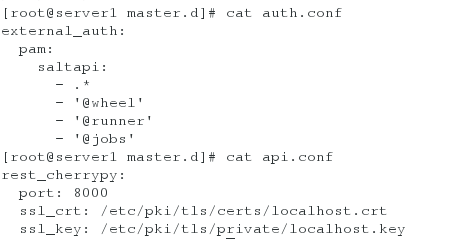The use of api
1. Install salt-api
[root@server1 ~]# Yum install-y salt-api # install API
2. Generating certificates and secret keys
[root@server1~] # cd/etc/pki/tls/private/# generates certificates and private keys
[root@server1 private]# openssl genrsa 2048 > localhost.key
[root@server1 private]# cd ...
[root@server1 tls]# cd certs
[root@server1 certs]# make testcert
3. Edit the api configuration file and add certificates and keys
[root@server1 certs]# cd /etc/salt [root@server1 salt]# vim master [root@server1 salt]# pwd /etc/salt [root@server1 salt]# cd master.d [root@server1 master.d]# vim api.conf [root@server1 master.d]# cat api.conf ##api.conf file rest_cherrypy: port: 8000##port ssl_crt: /etc/pki/tls/certs/localhost.crt ##certificate ssl_key: /etc/pki/tls/private/localhost.key##Secret key
4. Editing Authorization Documents
[root@server1 master.d]# vim auth.conf
[root@server1 master.d]# cat auth.conf
external_auth:
pam:
saltapi:##Authorized users (all four lines below are privileges)
- .*
- '@wheel'
- '@runner'
- '@jobs'

5. Establish authorized users and modify passwords
[root@server1 master.d]# useradd saltapi
[root@server1 master.d]# passwd saltapi
6. Restart the salt-master service and open the api service
[root@server1 master.d]# systemctl restart salt-master
[root@server1 master.d]# systemctl start salt-api
7. Check if the listening port (8000) is open
8. Get the api value (you can get the api value by logging in with your authorized user)
[root@server1 master.d]# curl -sSk https://172.25.32.1:8000/login - H'Accept: application/x-yaml'-d username = saltapi-d password = redhat-d eauth = pam_ # Get api
In the figure above,'token'corresponds to a column with api values
9. Success of using ping command card with api value
[root@server1 master.d]# curl -sSk https://172.25.42.1:8000 - H'Accept: application/x-yaml'-H'X-Auth-Token: b182ffb020daa4110 dbcc0815cb678e265a34fa4'-d client=local-d tgt='*'-d fun=test.ping\\\\\\\\
Successfully indicate that the connection is established correctly
- Editing scripts on server 1 for testing
[root@server1 ~]# vim saltapi.sh
[root@server1 ~]# cat saltapi.sh
# -*- coding: utf-8 -*-
import urllib2,urllib
import time
try:
import json
except ImportError:
import simplejson as json
class SaltAPI(object):
__token_id = ''
def __init__(self,url,username,password):
self.__url = url.rstrip('/')
self.__user = username
self.__password = password
def token_id(self):
''' user login and get token id '''
params = {'eauth': 'pam', 'username': self.__user, 'password': self.__password}
encode = urllib.urlencode(params)
obj = urllib.unquote(encode)
content = self.postRequest(obj,prefix='/login')
try:
self.__token_id = content['return'][0]['token']
except KeyError:
raise KeyError
def postRequest(self,obj,prefix='/'):
url = self.__url + prefix
headers = {'X-Auth-Token' : self.__token_id}
req = urllib2.Request(url, obj, headers)
opener = urllib2.urlopen(req)
content = json.loads(opener.read())
return content
def list_all_key(self):
params = {'client': 'wheel', 'fun': 'key.list_all'}
obj = urllib.urlencode(params)
self.token_id()
content = self.postRequest(obj)
minions = content['return'][0]['data']['return']['minions']
minions_pre = content['return'][0]['data']['return']['minions_pre']
return minions,minions_pre
def delete_key(self,node_name):
params = {'client': 'wheel', 'fun': 'key.delete', 'match': node_name}
obj = urllib.urlencode(params)
self.token_id()
content = self.postRequest(obj)
ret = content['return'][0]['data']['success']
return ret
def accept_key(self,node_name):
params = {'client': 'wheel', 'fun': 'key.accept', 'match': node_name}
obj = urllib.urlencode(params)
self.token_id()
content = self.postRequest(obj)
ret = content['return'][0]['data']['success']
return ret
def remote_noarg_execution(self,tgt,fun):
''' Execute commands without parameters '''
params = {'client': 'local', 'tgt': tgt, 'fun': fun}
obj = urllib.urlencode(params)
self.token_id()
content = self.postRequest(obj)
ret = content['return'][0][tgt]
return ret
def remote_execution(self,tgt,fun,arg):
''' Command execution with parameters '''
params = {'client': 'local', 'tgt': tgt, 'fun': fun, 'arg': arg}
obj = urllib.urlencode(params)
self.token_id()
content = self.postRequest(obj)
ret = content['return'][0][tgt]
return ret
def target_remote_execution(self,tgt,fun,arg):
''' Use targeting for remote execution '''
params = {'client': 'local', 'tgt': tgt, 'fun': fun, 'arg': arg, 'expr_form': 'nodegroup'}
obj = urllib.urlencode(params)
self.token_id()
content = self.postRequest(obj)
jid = content['return'][0]['jid']
return jid
def deploy(self,tgt,arg):
''' Module deployment '''
params = {'client': 'local', 'tgt': tgt, 'fun': 'state.sls', 'arg': arg}
obj = urllib.urlencode(params)
self.token_id()
content = self.postRequest(obj)
return content
def async_deploy(self,tgt,arg):
''' Asynchronously send a command to connected minions '''
params = {'client': 'local_async', 'tgt': tgt, 'fun': 'state.sls', 'arg': arg}
obj = urllib.urlencode(params)
self.token_id()
content = self.postRequest(obj)
jid = content['return'][0]['jid']
return jid
def target_deploy(self,tgt,arg):
''' Based on the node group forms deployment '''
params = {'client': 'local_async', 'tgt': tgt, 'fun': 'state.sls', 'arg': arg, 'expr_form': 'nodegroup'}
obj = urllib.urlencode(params)
self.token_id()
content = self.postRequest(obj)
jid = content['return'][0]['jid']
return jid
def main():
sapi = SaltAPI(url="https://172.25.32.1:8000",username="saltapi",password="redhat")
#sapi.token_id()
print sapi.list_all_key() ##Open this port to see that key is set to A
#sapi.delete_key('test-01')
#sapi.accept_key('test-01')
sapi.deploy('server3','nginx.service') ##Open this port to specify the host to install the corresponding service B
#print sapi.remote_noarg_execution('test-01','grains.items')
if __name__ == '__main__':
main()
Modify the following sections
def main():
sapi = SaltAPI(url="https://172.25.32.1:8000",username="saltapi",password="redhat")
#sapi.token_id()
print sapi.list_all_key() ##Open this port to view all key s
#sapi.delete_key('test-01')
#sapi.accept_key('test-01')
sapi.deploy('server3','nginx.service') ##Push nginx in server 3
#print sapi.remote_noarg_execution('test-01','grains.items')
View the results after execution:
Printed key value
Check whether server3 pushes nginx services